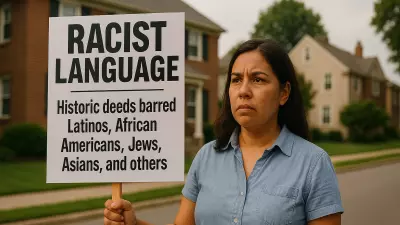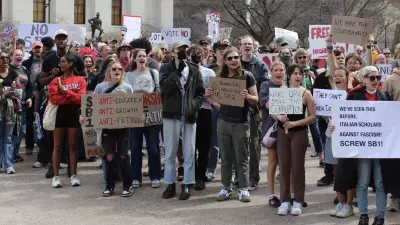Racist language in the deeds of many houses in Towson, a high-end suburb of Baltimore, is receiving new scrutiny from local advocates and real estate agents.

Many homes still have deeds that still contain language common before 1968 that refuse to sell houses to Latinos, people of “of negro extraction,” Jews, Asians or the mentally disabled. Language of that kind is common of homes of a certain age nationwide.
That has lead to a dizzying number of local and state attempts to remove those covenants, some of which have more successful than others.
Still, over a quarter of homes in Towson’s posh Stoneleigh neighborhood still contain the racist language, despite a push from some locals to remove it entirely.
“There’s no place where you can go where you won’t find them,” Kirsten Delegard, co-founder and project director of Mapping Prejudice at the University of Minnesota Libraries, told the Baltimore Banner.
Racist language in deeds for housing was common from the 1920s until the Supreme Court made it illegal in 1968. It was designed to keep neighborhoods as segregated as possible, and still plays an enormous part in why many neighborhoods in Baltimore remain historically segregated.
That practice combined with “redlining,” a banking tool used routinely during the same era to refuse financing to people of color for all but a few neighborhoods.
While that form of segregation is also illegal, it is still used throughout the United States via various forms including “digital redlining,” that keeps many low-income or neighborhoods of color from having access to tools like the internet, food and housing resources and banking.
Those neighborhoods also face a disproportionate number of predatory lending practices from financial institutions, including subprime or high interest loans, payday lending and a lack of access to credit building tools.
“Since the subprime crisis, mortgage credit has become more difficult to access, especially for Black and Hispanic households. Hearkening back to historic redlining practices, some lenders still shun the provision of mortgage lending and other services in minority communities,” Nancy McArdle and Dolores Acevedo-Garcia write in “Modern Day Redlining: How contemporary policies and practices continue to deny equitable access to opportunities.”
Towson also gained notoriety earlier this year as the hometown of accused murderer Luigi Mangione.







